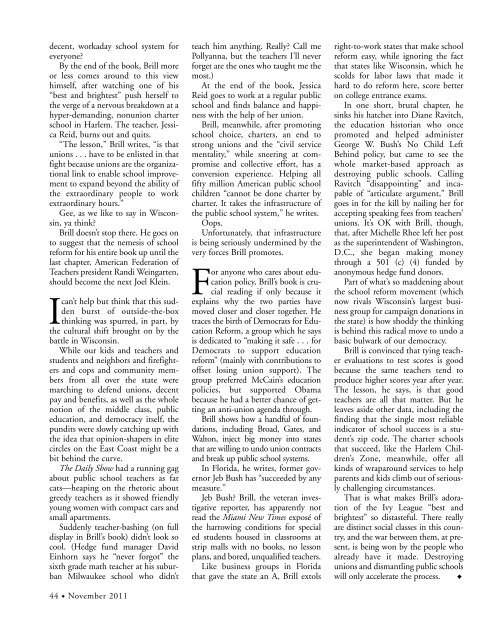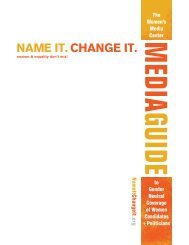Jodie Evans
Jodie Evans
Jodie Evans
You also want an ePaper? Increase the reach of your titles
YUMPU automatically turns print PDFs into web optimized ePapers that Google loves.
decent, workaday school system for<br />
everyone?<br />
By the end of the book, Brill more<br />
or less comes around to this view<br />
himself, after watching one of his<br />
“best and brightest” push herself to<br />
the verge of a nervous breakdown at a<br />
hyper-demanding, nonunion charter<br />
school in Harlem. The teacher, Jessica<br />
Reid, burns out and quits.<br />
“The lesson,” Brill writes, “is that<br />
unions . . . have to be enlisted in that<br />
fight because unions are the organizational<br />
link to enable school improvement<br />
to expand beyond the ability of<br />
the extraordinary people to work<br />
extraordinary hours.”<br />
Gee, as we like to say in Wisconsin,<br />
ya think?<br />
Brill doesn’t stop there. He goes on<br />
to suggest that the nemesis of school<br />
reform for his entire book up until the<br />
last chapter, American Federation of<br />
Teachers president Randi Weingarten,<br />
should become the next Joel Klein.<br />
Ican’t help but think that this sudden<br />
burst of outside-the-box<br />
thinking was spurred, in part, by<br />
the cultural shift brought on by the<br />
battle in Wisconsin.<br />
While our kids and teachers and<br />
students and neighbors and firefighters<br />
and cops and community members<br />
from all over the state were<br />
marching to defend unions, decent<br />
pay and benefits, as well as the whole<br />
notion of the middle class, public<br />
education, and democracy itself, the<br />
pundits were slowly catching up with<br />
the idea that opinion-shapers in elite<br />
circles on the East Coast might be a<br />
bit behind the curve.<br />
The Daily Show had a running gag<br />
about public school teachers as fat<br />
cats—heaping on the rhetoric about<br />
greedy teachers as it showed friendly<br />
young women with compact cars and<br />
small apartments.<br />
Suddenly teacher-bashing (on full<br />
display in Brill’s book) didn’t look so<br />
cool. (Hedge fund manager David<br />
Einhorn says he “never forgot” the<br />
sixth grade math teacher at his suburban<br />
Milwaukee school who didn’t<br />
44 u November 2011<br />
teach him anything. Really? Call me<br />
Pollyanna, but the teachers I’ll never<br />
forget are the ones who taught me the<br />
most.)<br />
At the end of the book, Jessica<br />
Reid goes to work at a regular public<br />
school and finds balance and happiness<br />
with the help of her union.<br />
Brill, meanwhile, after promoting<br />
school choice, charters, an end to<br />
strong unions and the “civil service<br />
mentality,” while sneering at compromise<br />
and collective effort, has a<br />
conversion experience. Helping all<br />
fifty million American public school<br />
children “cannot be done charter by<br />
charter. It takes the infrastructure of<br />
the public school system,” he writes.<br />
Oops.<br />
Unfortunately, that infrastructure<br />
is being seriously undermined by the<br />
very forces Brill promotes.<br />
For anyone who cares about education<br />
policy, Brill’s book is crucial<br />
reading if only because it<br />
explains why the two parties have<br />
moved closer and closer together. He<br />
traces the birth of Democrats for Education<br />
Reform, a group which he says<br />
is dedicated to “making it safe . . . for<br />
Democrats to support education<br />
reform” (mainly with contributions to<br />
offset losing union support). The<br />
group preferred McCain’s education<br />
policies, but supported Obama<br />
because he had a better chance of getting<br />
an anti-union agenda through.<br />
Brill shows how a handful of foundations,<br />
including Broad, Gates, and<br />
Walton, inject big money into states<br />
that are willing to undo union contracts<br />
and break up public school systems.<br />
In Florida, he writes, former governor<br />
Jeb Bush has “succeeded by any<br />
measure.”<br />
Jeb Bush? Brill, the veteran investigative<br />
reporter, has apparently not<br />
read the Miami New Times exposé of<br />
the harrowing conditions for special<br />
ed students housed in classrooms at<br />
strip malls with no books, no lesson<br />
plans, and bored, unqualified teachers.<br />
Like business groups in Florida<br />
that gave the state an A, Brill extols<br />
right-to-work states that make school<br />
reform easy, while ignoring the fact<br />
that states like Wisconsin, which he<br />
scolds for labor laws that made it<br />
hard to do reform here, score better<br />
on college entrance exams.<br />
In one short, brutal chapter, he<br />
sinks his hatchet into Diane Ravitch,<br />
the education historian who once<br />
promoted and helped administer<br />
George W. Bush’s No Child Left<br />
Behind policy, but came to see the<br />
whole market-based approach as<br />
destroying public schools. Calling<br />
Ravitch “disappointing” and incapable<br />
of “articulate argument,” Brill<br />
goes in for the kill by nailing her for<br />
accepting speaking fees from teachers’<br />
unions. It’s OK with Brill, though,<br />
that, after Michelle Rhee left her post<br />
as the superintendent of Washington,<br />
D.C., she began making money<br />
through a 501 (c) (4) funded by<br />
anonymous hedge fund donors.<br />
Part of what’s so maddening about<br />
the school reform movement (which<br />
now rivals Wisconsin’s largest business<br />
group for campaign donations in<br />
the state) is how shoddy the thinking<br />
is behind this radical move to undo a<br />
basic bulwark of our democracy.<br />
Brill is convinced that tying teacher<br />
evaluations to test scores is good<br />
because the same teachers tend to<br />
produce higher scores year after year.<br />
The lesson, he says, is that good<br />
teachers are all that matter. But he<br />
leaves aside other data, including the<br />
finding that the single most reliable<br />
indicator of school success is a student’s<br />
zip code. The charter schools<br />
that succeed, like the Harlem Children’s<br />
Zone, meanwhile, offer all<br />
kinds of wraparound services to help<br />
parents and kids climb out of seriously<br />
challenging circumstances.<br />
That is what makes Brill’s adoration<br />
of the Ivy League “best and<br />
brightest” so distasteful. There really<br />
are distinct social classes in this country,<br />
and the war between them, at present,<br />
is being won by the people who<br />
already have it made. Destroying<br />
unions and dismantling public schools<br />
will only accelerate the process. u



